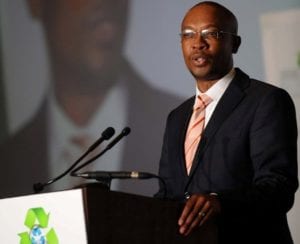Pictured: Executive Mayor Johannesburg, Councillor Mpho Parks Tau
70% S@S (separation at source) at household level in 3 years and a 20% reduction in waste to landfill by 2014 are just two of the innovative targets announced by the Executive Mayor Johannesburg, Councillor Mpho Parks Tau, as part of a new waste management strategy for the City being launched at the Joburg Waste Summit 2013, currently being held at the Sandton Convention Centre in Gauteng, South Africa. The aim of the Summit is for delegates to explore all opportunities that flow from the implementation plan, with the hopes of soliciting wider support from and for the waste management sector. Some of the solutions to help South Africa deal with some of its social and environmental challenges may be a lot closer to us than we have appreciated, the Summit heard.Johannesburg, like the rest of South Africa faces the challenges of unemployment, poverty, inequality and an increasingly limited space to dispose of its waste. These challenges could however be successfully met by better managing the city’s waste. Delivering the keynote address, City of Johannesburg executive mayor Parks Tau, challenged the about 400 delegates representing various organisations in the recycling and renewable sector to find an appropriate word for what is presently called waste. This, he said was necessary because of the increasing value that “waste” was increasingly contributing to the economy.Delegates included representatives from community organisations, glass, plastic, paper, packaging, and polystyrene.
They compared best waste management practices from other parts of the world including how in some developing world countries, the poorest citizens were using waste management to improve the standard of their lives while contributing to keep their cities clean. Drawing from experiences in Africa, Asia, South America and Europe, United Nations Environmental Programme representative Cecilia Kinuthia-Njenga shocked delegates by pointing out that 9.4million tons of food or a third of food produced in the world, ended up on landfill sites without it ever been eaten. The amount of food wasted and where it ended up struck a chord with the Johannesburg mayor. According to Tau, Johannesburg about a fourth of Johannesburg’s 4,4-million population went to bed hungry at least three times a year while food ended up on landfill sites. Responding to the startling numbers, Mayor Tau said the numbers a Johannesburg was fast running out of landfill sites and might have to export its waste to neighbouring cities or provinces. This however would come with cost implications for Johannesburg citizens because the waste would have to be loaded on vehicles to be disposed of elsewhere.






